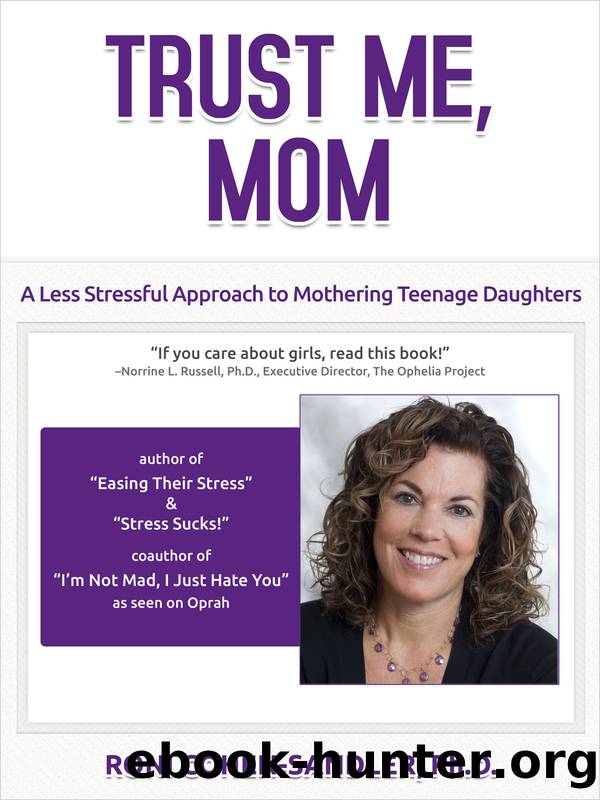Trust Me, Mom by Roni Cohen-Sandler Ph.D

Author:Roni Cohen-Sandler, Ph.D. [Cohen-Sandler Ph.D., Roni]
Language: eng
Format: epub
Tags: Trust Me; Mom: A Less Stressful Approach to Mothering Teenage Daughters, Self-esteem for teen girls, stress management, teen help books, adolescent development, parenting teens, mothers and daughters, adolescent substance abuse, social behavior, Dr. Roni Cohen-Sandler Ph.D., Mothering Teenage Daughters, teenagers, parenting, peer pressure, adolescence, anorexia, alcohol, condoms, puberty, dating, girls, curfew, homosexuality, teenage pregnancy, discipline, embarrassment, virginity, school, sexting, losing virginity, bullies, teenage pregnancy statistics, birth control, role models, texting, social skills and competences, parenting, teenage sexuality, drunk driving, teenage pregnancy facts, snooping, teenage angst, privacy, teenage depression, rules, partying, curfews, boyfriends, facts of life, parties, learning process, at risk youth, internet safety for teenagers, teenage anger, teenagers and the internet, media and teenagers, at risk teenagers, teenagers and tobacco, teenage friends, teenage resentment, bad influences, cell phones and teenagers, teen magazines, teenagers brain, teenagers and cars, teenage social life, teenage warning signs, ten-step trouble plan, cheating in school, high risk time, internet and teenagers, non-school friends
Publisher: Author & Company
Published: 2002-01-01T00:00:00+00:00
Even worse, some women raising teenage girls are pervasively haunted by their own traumatic childhoods. They cannot forget their sense of guilt, shame, and complicity in the events that hurt them or others. Thus they vow never to allow their daughters to do what they did or to suffer similar consequences. Yet in their anxiety, mothers may unwittingly fail to recognize that their daughtersâ mistakes are indeed repetitions of their own pasts. Through the distorted lens of their own teenage memories, they may either overlook their daughtersâ troubles or, conversely, read too much into them.
3. Clarify Your Beliefs About Her Errors
How you view your daughterâs mistakes determines in large part how you respond to them, affects your mother-daughter relationship, and, most especially, influences whether your daughter ultimately repeats them. Therefore, it is important to consider how you tend to view errors, and to make any necessary adjustments:
⢠What Does It Mean to You When Your Daughter Messes Up? Are you inclined to brand her forever in your mind as a black sheep (âShe always was my difficult child!â)? Do you immediately panic about serious issues (e.g., âMaybe thereâs something terribly wrong with her!â)? You might want to avoid rushing to such judgments. Instead first concentrate on discussing all the facts and underlying issues with your daughter.
⢠Do You Reflexively Assign Blame? Do you usually view errors as someoneâs fault? For example, do you tend to chalk up your daughterâs unfortunate behavior to the bad influence of undesirable people in her life (e.g., âSheâs exactly like her father!â or âIf only she wasnât friends with Sally!â)? Do you immediately criticize yourself for possible failures and mistakes (e.g., âMaybe I shouldnât have been so strict with her!â or âMaybe I should get stricter!â)? Or do you decide that your daughter is purposely trying to hurt you (e.g., âIs she determined to make my life a living hell?â)? If so, remember that your focus should be on helping your daughter to understand where she went wrong. When you are respectful of this process, you step back and give her the chance to grapple with this question and come to her own conclusions.
⢠Does Her Mistake Indicate Problems in Your Relationship? Are you apt to view her error as a condemnation of your relationship? In some cases, difficulties between mothers and daughters do contribute to girlsâ rebellious and self-defeating behavior. If you and your daughter habitually battle, struggle with trust and respect, have a tenuous connection, or fail to work out mutually agreeable rules and expectations, her negative behavior may be designed to elicit a certain reaction from you. Either deliberately or unconsciously, your daughter may want to make you upset, angry, more attentive, or even alarmed. She may be hoping you will regret a previous decision, change your mind, or become more solicitous of her wishes. If your daughter is using self-defeating behavior as a last-ditch strategy to deal with a troubled mother-daughter relationship, seeing a therapist together even for a few sessions
Download
This site does not store any files on its server. We only index and link to content provided by other sites. Please contact the content providers to delete copyright contents if any and email us, we'll remove relevant links or contents immediately.
| Early Childhood | Parenting Boys |
| Parenting Girls | School-Age Children |
| Single Parents | Teenagers |
The Lost Art of Listening by Michael P. Nichols(7498)
Rich Dad Poor Dad by Robert T. Kiyosaki(6616)
We Need to Talk by Celeste Headlee(5610)
I Love You But I Don't Trust You by Mira Kirshenbaum(3869)
The Complete Idiot's Guide to Coping With Difficult People by Arlene Uhl(3145)
Rich Dad Poor Dad: What The Rich Teach Their Kids About Money - That The Poor And Middle Class Do Not! by Robert T. Kiyosaki(2955)
A Burst of Light by Audre Lorde(2600)
The Book You Wish Your Parents Had Read (and Your Children Will Be Glad That You Did) by Philippa Perry(2523)
Dealing with People You Can't Stand by Dr. Rick Brinkman(2458)
Life Hacks by Dan Marshall(2452)
An Odyssey by Daniel Mendelsohn(2305)
The Expectant Father by Armin A. Brott & Jennifer Ash(2270)
Teach Your Child How to Think by Edward De Bono(2156)
No Time to Say Goodbye(2115)
The 7 Habits Of Highly Effective Teens by Covey Sean(2079)
What I Need by J. Daniels(2077)
The Out-of-Sync Child by Carol Stock Kranowitz(2053)
The Anxious Generation by Jonathan Haidt(2035)
I Don't Belong to You by Keke Palmer(1999)
